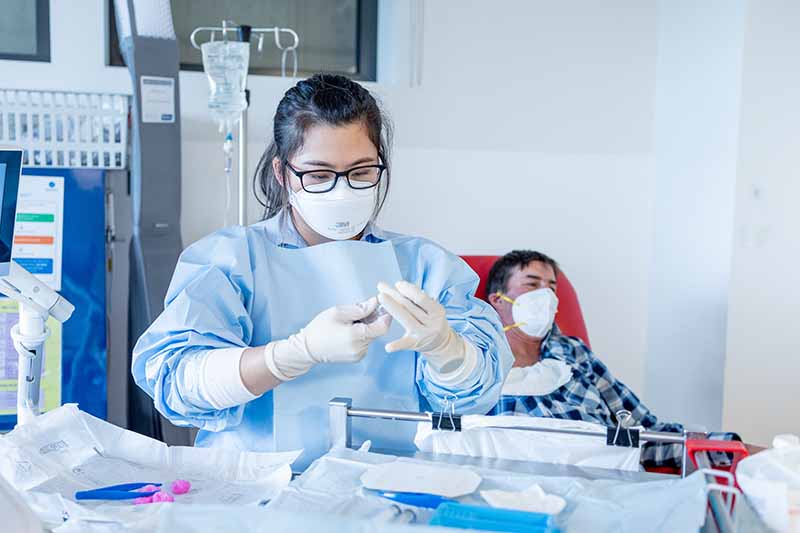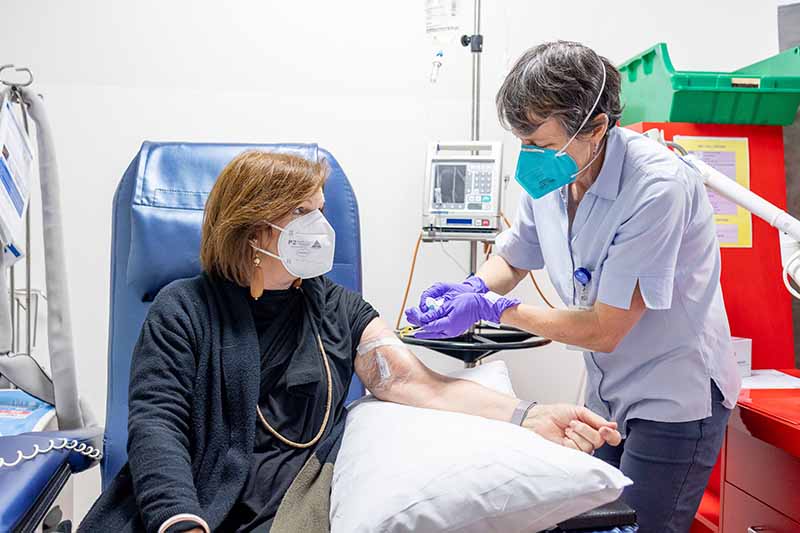Overview
Learning that you or someone you care for has bowel cancer can be a very overwhelming and frightening experience. From initial diagnosis through to cure or relapse, our Epworth care team are here to support you and your family at every step of the cancer care journey.
Each person living with bowel cancer has individual needs depending on their symptoms, health history and stage of cancer. Our team will proactively adjust the level of emotional and physical care provided to best suit your changing care needs and provide further options of support such as physiotherapy, dietitians, and psychologists as required.
What is bowel cancer?
Bowel cancer, also known as colon or colorectal cancer, occurs when abnormal cells in the walls of the bowel (large intestine, colon, or rectum) uncontrollably multiply.
How common is bowel cancer?
As Australia’s fourth most common type of newly diagnosed cancer, it is estimated that a person has a 1 in 19 (or 5.3%) risk of being diagnosed with colorectal cancer by the age of 85. There is no predictable cause of developing bowel cancer, other than the risk increases with age.
Procedural Gastroenterologist and Hepatologist at Epworth Hospital at Richmond, Dr John Halliday, has seen an increase in bowel cancer in younger patients, many of whom lack a family history of the disease.
Epworth fact sheet | What is bowel cancer?
We are becoming more conscious of it in the younger age groups. Though it remains uncommon in people under 50, there’s been a big increase of about 9% in the incidence between 1990 and now in young people
Signs and symptoms of bowel cancer
If you have experienced any bowel cancer symptoms, book a consultation with your GP as soon as possible. Catching cancer early can save your life.
Early stages of bowel cancer
Unfortunately, the early stages of bowel cancer typically have no symptoms. Therefore, it's incredibly important to screen for bowel cancer if you're aged 50 or over.
Bowel cancer symptoms may include:
- Changes to bowel movements (diarrhoea, constipation, or the feeling of incomplete emptying).
- Blood in stools
- Abdominal pain, bloating or cramping
- Weight loss
- Unexplained fatigue
We all get periods of diarrhoea or constipation from time to time but if there’s a persistent change hanging around, that can’t easily be explained away by some other lifestyle change like a major change in diet, then I would recommend talking to the GP about it.
Bowel cancer screening and diagnostics
Epworth endoscopy provides easy access to a colonoscopy and gastroscopy performed by specialists using the latest technology, with all specialists and anaesthetist fees covered for patients with eligible health cover.
Bowel cancer screening - early detection can save your life
Treatment can cure around 90% of bowel cancer cases if identified early. Unfortunately, diagnosis is often at a later stage because there can be an absence of symptoms in the early stages. We encourage our patients who are aged or over to arrange for a free bowel cancer screening using a faecal occult blood test (FOBT). A FOBT looks for small amounts of blood in a stool sample which is a possible sign of early bowel cancer.
Bowel cancer diagnostics
Following your screening results, further tests such as a colonoscopy may be recommended by your doctor if bowel cancer is suspected.
Blood test
During your initial consultation, your doctor may order several blood tests to check your overall health and to detect proteins produced by cancer cells. These proteins are called tumour markers.
Physical examination
During your initial consultation, your doctor will feel your abdomen for swelling. Your doctor may discuss an internal physical examine, where your doctor will insert a gloved finger to feel for lumps or swelling in the anus or rectum.
Colonoscopy and biopsy
A colonoscopy is a type of endoscopic procedure that allows a doctor to examine the inside lining of your large bowel. The doctor will use a colonoscope - a long, thin flexible tube with a small camera and light attached, to view pictures of the inside of your bowel on a video screen. The colonoscope bends so it can move around the curves of your colon. It can also be used to remove growths or polyps, which are fleshy growths in the bowel lining. A colonoscopy can also be used to take a biopsy, a very small section of the bowel lining, which can be tested to identify bowel cancer.
Computer tomography (CT) scan
If you have experienced a rapid blockage of the bowel, a CT scan and an operation can be used to diagnose bowel cancer.
Patient pre-admission information
Prior to undergoing a colonoscopy, you will undergo a pre-admission consultation to confirm your suitability for Priority Endoscopy at Epworth.
Generally, patients will only meet with the specialist who is performing the procedure on the day of admission to Epworth, unless specifically requested.
This booklet below contains important pre-procedure information patients need to be aware of, in addition to any instructions their specialist provides. Epworth provides a copy of this booklet to patients prior to their procedure.
Find your Epworth bowel cancer specialist
Colorectal surgeons | Gastroenterologists | Radiation oncology service | Medical oncologists
Bowel cancer treatment overview
Epworth specialists are here to support you throughout your treatment journey and to help you and your family understand your treatment options.
Bowel cancer treatment at Epworth
Our patients are treated in the Oncology units of our hospitals which offers a specialised variety of surgical procedures, chemotherapy, and radiotherapy treatment for bowel cancer.
What treatment will I need?
Every patient's treatment and care journey will be based on their individual needs. If your bowel cancer has spread beyond the bowel (metastatic bowel cancer) you may need a combination of treatments listed below.
To support your bowel cancer care, Epworth offers patients:
Bowel cancer surgery
Bowel cancer surgery can be used to remove cancerous tumours from the bowel. If you have been diagnosed with bowel cancer, your doctor will recommend removing the tumour (surgery). This may or may not be followed by chemotherapy.
If you have been diagnosed with metastatic bowel cancer your doctor may recommend surgery combined with chemotherapy and radiotherapy.
Bowel cancer chemotherapy
Chemotherapy is a common form of treatment that involves the use of anti-cancer drugs to attack cancer cells. Chemotherapy is often used alongside other treatments such as radiotherapy or surgery.
Bowel cancer radiotherapy
Radiotherapy is the use of radiation to treat and manage cancer. Supported by the latest world-class technology and evidence-based techniques, highly experienced team of radiation oncologists, radiation therapists, physicists and nurses are committed to providing compassionate, exceptional care for patients and their loved ones.
Immunotherapy and targeted therapy
Immunotherapy and targeted therapy may be recommended for metastatic bowel cancer or bowel cancer with certain gene test results.
Immunotherapy improves your immune system’s ability to fight cancer cells. Targeted therapy involves drugs that target features of cancer cells to stop them growing.
Stomal therapy
Stomal therapy may be suitable after a surgical procedure such as a colostomy. A colostomy involves creating an opening, or ‘ostomy’ from the bowel, onto the abdominal wall. A specialist nurse who has undertaken further study to address the needs and concerns associated with colorectal surgery is on hand at Epworth for patient education and support before and after complex stomal surgery. Learn more
Why choose Epworth for cancer care?
Epworth HealthCare is Victoria's largest not-for-profit private hospital group. Renowned for excellence in diagnosis, treatment, care and rehabilitation. Epworth is an innovator in Australia’s health system, embracing the latest in evidence-based medicine to pioneer treatments and services for our patients.
Supported by excellent facilities, we integrate clinical practice with education and research to deliver outstanding patient care, each and every day.
Epworth cancer care locations
Epworth Rehabilitation
Bowel cancer locations:
Bowel cancer rehabilitation
Rehabilitation doesn't start after your treatment has ended. You may benefit from our holistic rehabilitation programs at any time throughout your cancer journey. Our programs can support you to physically and emotionally prepare for treatment and restore your strength and wellbeing.
What does the cancer rehabilitation program involve?
Before you start
You will meet a rehabilitation doctor and allied health team for a medical, psychosocial, and physical assessment.
Everyone's cancer care journey is different. The assessments will help the team understand your specific needs to develop the right program for you. You will work with the team to develop goals to work towards throughout the program.
During the program
Depending on your assessment and individual needs, you may complete your program:
- as part of a group, with other people, who have been diagnosed with varying cancers
- on your own
Most people will attend as an outpatient, coming to hospital for a few hours once or twice a week, over several weeks. Some people may need to stay overnight in hospital and complete a program over several consecutive days.
Either way, you will receive the same support from our team to address your physical, functional and emotional needs.
Your program may include:
- A physical exercise component to help restore movement, strength and fitness
- An educational component where you will learn about different areas associated with your cancer diagnosis and treatment and how to manage them, including:
- fatigue
- pain
- emotional wellbeing
- body image and self-esteem
- work or family challenges
- relationships
- late-onset of side effects.
At the end of your program
Our rehabilitation team will keep in touch with your referring doctor and/or treating team throughout the program and our team will keep them informed about your progress.
They will also connect you to local services and support networks so you can leave our program with the strength and confidence to live life to your fullest potential.
Who will support me during the rehabilitation program?
Depending on your needs, you may see some or all of our multidisciplinary team which includes:
- Rehabilitation specialist doctor
- Cancer nurse
- Exercise physiologist
- Physiotherapist
- Psychologist
- Social worker
- Occupational therapist
- Dietitian.
How can I access a rehabilitation program?
Referrals
A referral from your specialist or GP is required to participate.
Ask your doctor to complete the referral form at www.epworth.org.au/rehab and return it to us via fax: 03 9982 6696 or email: [email protected]
Locations
Group programs are located at Epworth Camberwell and Epworth Hawthorn.
Individual programs can be accessed at Epworth Brighton, Epworth Camberwell, Epworth Geelong, Epworth Hawthorn or Epworth Richmond Rehabilitation.
Contact us
If you have any questions about our cancer rehabilitation programs, call us on: 1300 345 600.
Life after bowel cancer treatment
Life after bowel cancer treatment can pose its own challenges but our Epworth specialists are here to support you.
Life after treatment
Life after bowel cancer treatment can be a mixture of emotions. You may not 'bounce back' as quickly as you like, but be kind to yourself and start making plans with your family or carers.
Remember that:
- You may still feel fatigued for a while after finishing treatment.
- If required, make an advanced care plan.
- Ask for help. If your body has changed due to treatment, remember help is out there to support you to feel your best and regain your sense of identity and self-esteem. Speak with your care team about options to support your general wellbeing after treatment.
Follow-up appointments
Epworth patients in remission for bowel cancer will likely need follow-up appointments that may include a blood test, CT, PET, or MRI scans to ensure abnormal cells have not returned and to check in on your overall wellbeing.
Managing your health and wellbeing ongoing
Knowing how to best manage your wellbeing ongoing is an essential step towards recovery. We encourage you to utilise resources such as Bowel Cancer Australia.
Palliative care
In some cases, palliative care may be discussed with you and your family. Epworth palliative care aims to relieve you of symptoms and manage pain.
Information for loved ones and carers
Does someone you care about have bowel cancer?
When someone we care for is diagnosed with cancer, it is a natural response to want to offer support and help.
Thoughtful support tips
- Have an open conversation and acknowledge they might not be ready to accept support yet.
- If your loved one is ready to accept help, offer a mixture of ideas that you can commit to. These might include emotional or practical support such as cooking meals or just being available to listen.
- Read the Caring for someone with cancer article by Cancer Council Victoria.
Being a carer for a loved one with bowel cancer
Becoming a carer for a loved one with bowel cancer is an emotional time for your entire family. Remember to also look after your own wellbeing during this journey, as you can only offer sustainable support if you're looking after yourself as well.
Resources:
Find your Epworth bowel cancer specialist
Colorectal surgeons | Gastroenterologists | Radiation oncology service | Medical oncologists


